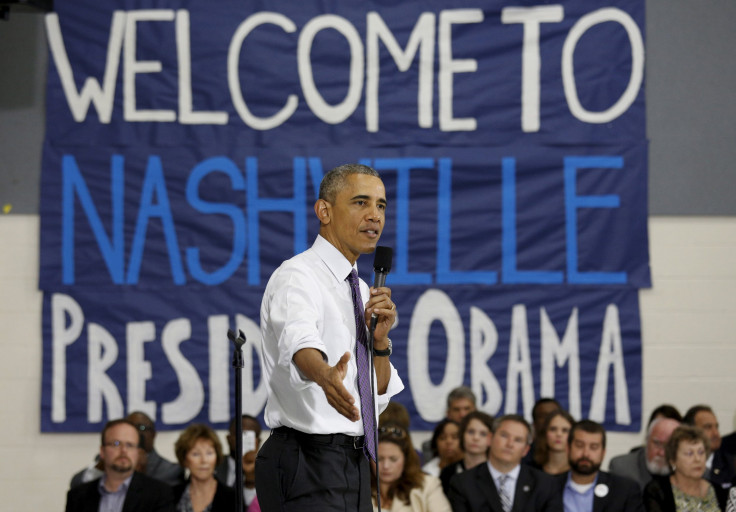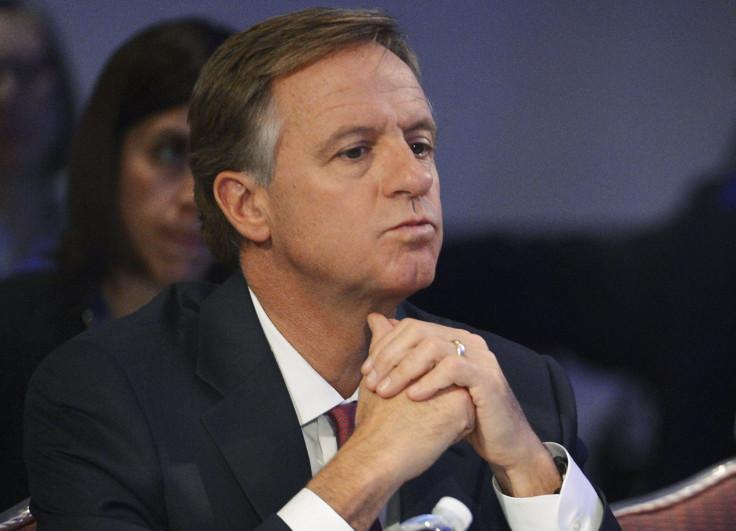Supreme Court Healthcare Ruling: State Medicaid Expansion Next Battle For Obamacare

When President Barack Obama landed in Nashville, Tennessee Wednesday afternoon, he had one particular point to make: his health care law was working, against all odds, and yet it could still be better. “It is unfortunate that getting this thing done has gotten so political,” Obama told an audience at Taylor Stratton Elementary School.
In the week since the Supreme Court upheld a central component of Obama’s signature legislation, the Affordable Care Act, state and federal officials alike have seized on momentum generated by the victory to renew calls to expand Medicaid and analysts say there may be no better time to raise the issue. The Supreme Court ruling not only quelled doubts for many state lawmakers about the law’s longevity, but also reinforced the notion that affordable health insurance should be widespread throughout the country, creating new impetus for proponents to champion the law and for opponents to reconsider how they might benefit from it, according to experts.
“People are going to want to understand why affordable coverage is available in other states but not their own,” Linda Blumberg, a senior fellow at the Urban Institute’s Health Policy Center, said.
In a decision released Thursday, the Supreme Court ruled 6-3 that federal subsidies to offset the cost of health insurance were legal for residents of all states. The plaintiffs in the case had argued that because of four words in the law, “established by the State,” such financial assistance was legal solely in states that created their own health insurance exchanges, rather than the 34 states that relied on the federal marketplace. Until the court’s ruling, the possibility that the subsidies would be struck down and health insurance rendered unaffordable for more than 8 million people provoked uncertainty among ordinary citizens and lawmakers alike.
But now that those concerns have been laid to rest, public focus has shifted to another pillar of the law, the expansion of Medicaid that could give coverage to an additional 11 million people. To date, 29 states and the District of Columbia have expanded Medicaid and Alaska and Utah are currently considering doing so. The remaining 19 states have decided against extending the program, for now.
A Financial Opportunity
Originally, the Affordable Care Act essentially required states to accept federal dollars to expand Medicaid to a broader swath of low-income Americans along lines stipulated by the federal government. But the Supreme Court ruled in 2012 that this part of the law was unconstitutionally coercive, because if a state opted against an expansion, it could lose pre-existing funding for Medicaid, a program dating back to 1965 that is jointly funded by the state and federal governments. With the 2012 case, Medicaid expansion became optional, and states gained more negotiating power over how they could use federal dollars to fund that extension.
Economists, policy researchers and supporters of the law tout Medicaid expansion as a far more fiscally and economically responsible decision than doing nothing at all. If every state expanded Medicaid, the number of uninsured people would drop by 4.3 million in 2016, researchers at the Urban Institute have found. State and local governments would save anywhere between 25 and 50 percent of what they ordinarily spend reimbursing doctors and hospitals for uncompensated care, or medical treatment for people who cannot pay. Those savings would range anywhere from $5 billion to $10 billion over the next decade.
“The economic rationale for any state to take up the Medicaid expansion has been pretty overwhelming for a long time,” said John Holahan, a fellow at the Urban Institute, pointing out that federal funding helps states cover the costs of those newly insured in a Medicaid expansion, albeit on a gradually diminishing scale.
In 2014, about 36 million people in the U.S., or 11.5 percent of the population, lacked health insurance, according to the National Center for Health Statistics. The states with the highest percentage of uninsured were Texas and Oklahoma, both at 21.5 percent, followed by Alaska at 21.2 percent, and Florida, where 18.8 percent lack health insurance. If states expand Medicaid, families of four with annual incomes of roughly $30,000 or less, or individuals earning less than $15,000 per year, become eligible for health insurance.
States Discuss Expansion
Many states led by conservatives have refused to expand Medicaid under the terms outlined by the government, in part because of their ideological opposition to accepting federal funding and to the entire Affordable Care Act itself. Nevertheless, the Supreme Court’s 2012 ruling granting states greater flexibility in negotiating how they could use federal dollars to expand Medicaid has led some to consider doing so, especially now that the law is increasingly part and parcel of the U.S. health care landscape.
The day the most recent Supreme Court decision was announced, Alaska Gov. Bill Walker hailed the ruling allowing subsidies to stand. He also wasted no time urging state lawmakers to embrace Medicaid expansion. “Now it’s important that we continue to work toward Medicaid expansion, so more Alaskans can receive the health coverage they need,” he said in a press release, which noted that more than $1 billion in federal funding would flow to Alaska to help the state expand Medicaid coverage to nearly 42,000 people. Alaska’s legislature is majority Republican, and a House committee there blocked Walker’s Medicaid expansion bill at the end of the most recent legislative session.
It’s not the first time a conservative legislature has refused federal funding to allow Medicaid expansion or proposed alternatives. In Tennessee, Gov. Bill Haslam first presented a plan in 2013 to use federal money to buy private health insurance for the population that would qualify from expanded Medicaid. It has yet to pass, although Haslam has continued to promote his plan.

“We made the decision in Tennessee nearly two years ago not to expand traditional Medicaid,” Haslam said in December. “This is an alternative approach that forges a different path and is a unique Tennessee solution. This plan leverages federal dollars to provide health care coverage to more Tennesseans.”
Still, Haslam’s plan didn’t survive a Senate committee, much less the Republican-dominated state Legislature. That could be one of the reasons Obama chose Nashville Wednesday to tout his health care law.
“The key importance of the Supreme Court case was that it cemented the permanent place of the Affordable Care Act in the American health care system,” Michael Sparer, a professor of health policy at the Mailman School of Public Health at Columbia University in New York, said. “President Obama and federal officials more generally are looking to capitalize on the momentum generated by the decision.”
In Kansas, state legislators have also renewed calls to expand Medicaid following the Supreme Court ruling. Three state lawmakers proposed different versions of expanding Medicaid in the last legislative session, but none of them passed.
“It is time for the [Kansas] administration to actively develop a strategy to expand Medicaid/KanCare,” state Rep. Tom Sloan, a Republican, told the Lawrence Journal-World shortly after the Supreme Court's decision. Others staunchly opposed the idea. "We will not spend one more penny fixing Congress' mistakes, whether that means rejecting Medicaid expansion or a state exchange," state Sen. Mary Pilcher-Cook, a Republican, said.
For some state lawmakers, the Supreme Court decision removed an element of uncertainty that could allow legislation on Medicaid expansion to move forward. Utah State Rep. Jim Dunnigan, a Republican and the House Majority Leader, said he met with other lawmakers Wednesday morning to discuss how to proceed with expanding Medicaid in the state. “Our discussion was the Affordable Care Act is here to stay, at least for a while, so now we need to make the best of it,” he said. Utah, along with Alaska, is one of two states considering an expansion of Medicaid.
The fact that regular legislative sessions throughout the 50 states are over for the time being could actually be a boon to Medicaid expansion. “It’s almost easier to work out that kind of deal when legislatures are not in session,” Sparer explained, because governors and executive officials could be free to negotiate parameters acceptable to the federal government, without having to wrangle with state lawmakers.
Eventually, though, any Medicaid expansion would still have to be approved by state legislatures. But given popular support for expanding Medicaid, even among residents of the conservative South, where a majority of residents of Alabama, Georgia, Louisiana, Mississippi and South Carolina polled in 2013 said they favored doing so, it seems increasingly likely that lawmakers will have no choice but to expand health care access.
“The governments have to respond to pressure from their residents and their healthcare providers,” said Blumberg, who said she expected most states to eventually expand Medicaid. “It’s just hard to known how long it will take."
© Copyright IBTimes 2024. All rights reserved.






















